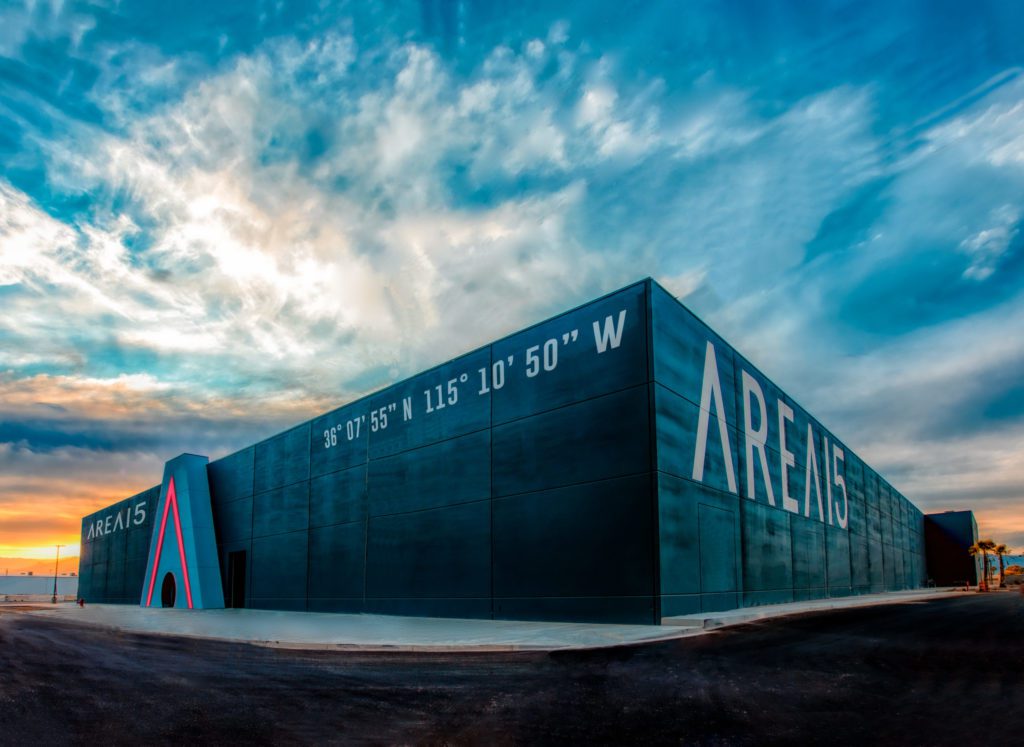
by admin | Nov 9, 2021 | Design Services, Mixed Reality, News, Projection Mapping, Virtual Reality, Virtual Worlds
On August 29th and 30th at AREA15 Las Vegas, Epic Immersive welcomed immersive industry luminaries from Secret Cinema, Marshmallow Laser Feast, David Byrne’s Theater of the Mind, Broadway, Swamp Motel, Meow Wolf, Delusion, Mycotoo, AREA15, Boomtown Fair, Les Enfants Terribles, The Oregon Shakespeare Festival, and more. As well as international guests from companies in China, India, Singapore, Russia, and Europe.
Epic Immersive is an immersive experience agency that has created 14-acre fictional cities and underground wonderlands. Companies like Apple, Google, and Facebook have commissioned Epic Immersive experiences.

The 2-day event included speakers Mycotoo’s Fri Forjindam, Fifth Wall Forum’s Stephanie Riggs, AREA15’s Michael Beneville, the Oregon Shakespeare Festival’s Nataki Garrett, and the team behind VR theatre experience Welcome to Respite (Tribeca Film Festival 2021 Official Selection), with many more.
Alt Ethos caught up with Steve Boyle, co-founder of Epic Immersive (co-created with Kimberly Flynn) to discuss event curation, announcements, and exciting future plans.
-
The Alt Ethos team really enjoyed The Immersive Industry Homecoming Summit. What was your process for curating the speakers; how did you go about choosing them?
We (Steve Boyle and Kimberly Flynn) worked together to identify the most compelling movers-and-shakers from the global immersive scene across a number of genres and mediums. It was of supreme importance to us that we threw a truly global event, and that our speaker roster reflected the incredible diversity of our field, highlighting femme and BIPOC creators.
-
We noticed that there were some announcements made at the event from the speakers. Can you please share some of those?
Two big ones come to mind: Stephanie Riggs announced the creation of Odeon Theatrical, a new platform that delivers AR content for live theatre, and Kim Adams announced the return of Adventure Lab.
-
What was the moment that surprised you the most at the event? Or a “wow” moment that comes to mind?
Steve: The wow moment for me was really just being there — those first moments especially when the energy is so high and the anticipation is there and we’ve really, truly come together for the first time in 18 months, with tons of safety precautions in place, and we’ve made it together safely. That was an amazing moment I’ll never forget.
Kim: Wow moments for me were in all the excitement and enthusiasm throughout the entire process from the speakers to our attendees, the positivity, excitement, support and joy from everyone involved and from everyone that attended was really magical. It was wonderful to feel the community excited to be sharing an experience again after such a long break.
-
Any shout-outs you would like to share?
Huge, huge thanks to projectionist and technical director Jacob Vorperian, and our tech wiz Christie Casey.
-
What are the future plans for The Immersive Industry Homecoming Summit?
Stay tuned! We’ll definitely be back in Vegas, and you’re going to want to be a part of a whole circuit of events we are planning in 2022.
-
What’s next for Epic Immersive?
A return to large-scale immersive experiences in 2022. Once again, stay tuned for big announcements!
We thank Steve Boyle for taking the time to chat with us and appreciate all of the effort that the Epic Immersive team, speakers, and collaborators put forth to make this Summit such a special event. Bringing together a group of visionaries, technologists, and storytellers is no small feat. Alt Ethos enjoyed the projection mapping within the space, the deep conversation from the speakers, the diversity of the group, and the pace of the presentations. We learned deeply about different companies and artists doing cutting-edge immersive work. Also, let’s not forget about the unique container that the summit took place in. If you’re ever in Las Vegas make sure to visit Area15.

AREA15 is an immersive playground, all rolled into a vast and vibrant space. Throw an axe, wander through a bamboo volcano, race on a zip line, or explore other mesmerizing realms. From the futuristic to the thrill-seeking, there’s an experience for everyone here.
Epic Immersive creates story-driven immersive experiences with explorable, 360-degree worlds. From ticketed experiences to corporate events to marketing activations, they deliver epic, unforgettable journeys.


by admin | Apr 2, 2020 | Design Services, How to, Mixed Reality, Virtual Reality, Virtual Worlds
Since coronavirus was declared a pandemic, the phrase “Just another day at the office” has taken on a whole new meaning. When nationwide social distancing was put into place, millions of face-to-face events and meetings were canceled or postponed.
Thankfully, video conferencing makes it possible to stay connected in work and in life without risking the health of yourself or others. Make virtual conferencing a breeze for your audience with Alt Ethos’ 8 things you can do in advance that will make the transition to virtual conferencing easier.
1. Choose a Platform
There are a number of video conferencing applications out there, and not all are created equal. FaceTime and Messenger are great for chatting person-to-person, but when it comes to virtual events and conferences, you will need more capabilities and features. Consider the following when choosing which platform to use:
- How many people will be in the meeting?
- Is it an interactive meeting or more one-sided?
- Will you need screen share capabilities or other multimedia features?
- What are your tech needs in terms of sound and lighting?
2. Set Expectations Ahead of Time
Have you ever walked into an event or meeting expecting one thing and come out having experienced something entirely different? That can easily happen with video conferences too, and it’s not an experience you want to give your attendees. Set the tone for smooth interactions online before attendees sign up by clearly outlining:
- Which platform the event or meeting will be held. Is there a capacity limit or deadline for signing up?
- What their role in the virtual conference will be. Is it an interactive session where they’ll need to be ready to provide feedback and commentary?
- What level of engagement you expect from them. Will they need to show up with video on, or is audio only okay?
3. Create a Workable Agenda
Because everything is virtual, it’s tempting to think you can pack more in a short window of time. Resist the urge, says Jeff Cobb of Leading Learning in his article “12 Tips for a Successful Virtual Conference”.
“The brain can only absorb what the butt can endure. Shorter is often better for sessions. And don’t forget to build in breaks—attendees will appreciate 15 minutes to check voicemail and e-mail and address other needs. Even in the virtual world, people have to go to the bathroom.”
4. Prep Your Attendees
Once your attendees have signed up, you’ll need to let them know some basic information about the virtual sessions. what you’ll be discussing, who will be there, and what they can do ahead of time to be ready for the meeting. Send out an email with a basic outline of the virtual session. Don’t forget to tell them if there’s anything they’ll want to have on hand to help them get the most out of the session, like a notebook and pen.
5. Be Available to Answer Questions
Virtual conferencing is going to be a new experience for some. The more education and answers you can provide BEFORE the conference call or virtual event starts, the less you’ll have to provide during the actual event.
“Folks will be more likely to pay—whether for a big-ticket sponsorship or a simple registration—if they can see for themselves what the virtual conference will be like,” said Cobb. Make a screen share video with step-by-step instructions on how to sign up for and install the video conference app you’ll be using, and plan to have extra tech support available to answer questions. Designate a specific email, messenger chatbot, or phone line for questions.
6. Do a Trial Run
If you have staff, speakers, or sponsors who will also be involved in the online event, spend time before the event putting resources in place so they feel comfortable and ready to do their part when the time comes.
Consider giving speakers and sponsors a free pass to test out the platform ahead of time, and don’t be afraid to do a trial run or two. You can’t always troubleshoot issues if you don’t know what issues to look for. A trial run will give you a chance to identify any bumps that need to be smoothed over.
The more prepared your staff is, the less stressed you’ll be. Run some contingency plans for customer service issues and create clear guidelines for how staff can help with things like Q&As and breakout sessions.
7. Don’t Forget the Reminder
People are busy, so a virtual event is appealing for many reasons outside of the current health situation. No making travel plans, packing, hotels, or flights. For the attendees, not having to do all the physical planning and prep for an in-person event can make it easy to forget to show up. You’ll need to remind them.
There are several ways to remind your registered attendees. We recommend sending out email or text reminders. Cobb suggests sending reminders a week before, one day before, and the day of the event. You could also create an exclusive group on social media to hype the event. Only registered attendees can join, and you can drop video teasers, downloadable resources, Live video, and more to keep attendees engaged and excited.
No matter how you choose to keep the virtual event top of mind for your attendees, always make sure to include all the pertinent information about how to access the conference and where to go for help.
8. Outline Virtual Etiquette Guidelines
Once you have everyone live in the session, you’ll want to set the tone. Virtual conferencing is a new world for a lot of people. Don’t assume everyone understands good etiquette when it comes to online meetings and events. Let them know how they can do things like:
- Ask or send questions without interrupting
- Stay engaged with the content
- Respect other attendees and the speakers by muting their microphones when there’s background noise
- Access supplemental content like side decks and PDF documents
- Request help with technical issues
Enjoy Your Virtual Conferencing Event
The better prepared you are before your event, the more relaxed and engaged you can be during the event. These tips give you guidelines on things you can do ahead of time that will not only help you but your staff, speakers, sponsors, and attendees.
Learn More About Alt Ethos
Want to create your own unique and memorable virtual conference or workshop experience but not sure where to start? We can help! Visit us at www.altethos.com.
References
Video Conferencing. Stanford University. https://uit.stanford.edu/videoconferencing/best-practices. March 8, 2019.
Cobb, Jeff. “12 Tips for a Successful Virtual Conference”. Leading Learning. https://www.leadinglearning.com/virtual-conference-tips/




